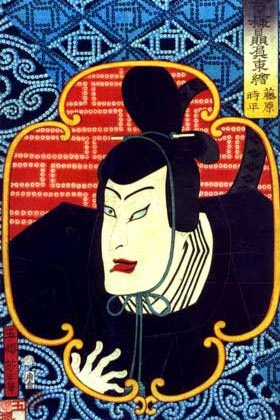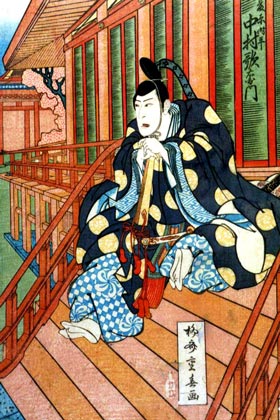| SHIHEI NO NANA WARAI |
| Play title | Tenmangû Natane no Gokû |
| Common title | Shihei no Nana Warai |
| Author | Namiki Gohachi, Nakamura Akei, Tatsuoka Mansaku (1777) Fukuchi Ôchi (1897) |
| History |
The drama "Tenmangû Natane no Gokû" was premiered in Ôsaka in the 4th lunar month of 1777, produced by Ogawa Kichitarô I at the Kado no Shibai [casting]. The current version of "Shihei no Nana Warai", the 2nd act of "Tenmangû Natane no Gokû", is based on a revision made by Fukuchi Ôchi, which was staged in November 1897 at the Kabukiza, starring the Meiji star Ichikawa Danjûrô IX in the role of Fujiwara no Shihei. The role of Shihei is currently the "property" of Kataoka Gatô V, who performs it regularly all over Japan main theaters. |
| Structure |
The play "Tenmangû Natane no Gokû" was originally in 9 acts. "Shihei no Nana Warai" (literally "Shihei's seven laughs") is the second act. |
| Key words |
Giri/Ninjô Heian Jidai Jidaimono Sentô Gosho Sugawara Michizane |
| Summary |
This is a dark tale of the exile of Sugawara no Michizane, a servant of Emperor Uda in the Heian period. The place is the Sentô Gosho and at court it is common knowledge that the well respected Sugawara no Michizane is under investigation for dissension and, though he seems to be unaware of this, there is an awful lot of whispered gossip going on. Though it is the occasion of Spring Festivities in the capital and the occasion of the reading of a poem in honour of Michizane an official public declaration of Michizane's dissention is made. He is to be demoted to the rank of a minor official and exiled a long way away from Court, to Kyûshû in the far West of Japan. Michizane is looking for support and is unsure whether or not he should use this occasion to enlist the backing of Fujiawara no Tokihara (Shihei), a public official, the Sadaijin (Minister of the Left) and the other main protagonist in this story. Though Michizane is leaving the Emperor is unsure and feels in his heart that Michizane's departure should be delayed. Shihei tries to comfort the Emperor saying that even though Michizane is being exiled and demoted he still deserves the Emperor's heartfelt congratulations for his service. As Sugane, Kuramochi and Sadakuni, all high court officials, take their leave a quietly subdued though unabashed Michizane, trusting the Emperor's judgement, stands up and bows. Shihei also stands up and as the tension mounts both put on their shoes and leave the court desending a set of stone steps. Michizane who is in low spirits really is leaving. Shihei stays back and appears to be wavering. In tears he says that if the circumstances change... Michizane, also in tears, mumbles bitterly that if his karma should change... Michizane looks around him, taking stock of the situation, as Shihei too appears to do the same. They bid each other a sad farewell as Michizane and Shihei clasp hands trustfully. They appear to both be feeling very sad and Shihei appears to feel sympathetic to Michizane's predicament, Michizane having lost his rank and, dejectedly, having to bear this burden alone. The court all feel the same way as Michizane disappears, sobbing, along the hanamichi followed by his weeping faithful retainer Terukuni. As the clappers sound Shihei dramatically cuts a mie posture revealing his true nature to the audience. Michizane, escorted by Terukuni enter together. Terukuni is forced to admit that he really is unable to help Michizane in his predicament and though feeling wretched and with a heavy heart he shrugs his shoulders and bids Michizane farewell. At a side doorway Shihei stands smiling, full of himself. His bearing is cold and calculating and he is seized by about of suppressed laughter. "You've had bad luck! Ha! Ha! Ha! Ha!" he says. The strong beats of the large drum sound 'Ton! Ton!' The orchestra plays Gidayû music clearly and elegantly. Shihei, with his expressions of concern and in the manner of his farewell, has skilfully deceived the members of the court into thinking that he has an honourable and supportive relationship with Michizane. As the concealed orchestra strikes up the set of the Imperial Palace is revealed and Shihei,
whose aloof wickedness and shallow duplicity appear to have intensified, appears at stage left as,
holding the railings of the Kizahashi bridge, he sits down. A clapper on the right sounds. With one hand on and leaning against the railing Shihei begins... Though questionably a child of successive generations of Fujiwara, it's rare for someone like Michizane to win a position of such long term trust and confidence at the Court of Sentô Gosho. But then Michizane had the ready wit and learning to excel in society and become a splendid and praiseworthy Daijin (Cabinet Minister). However, even with those mounting assurances of the resolute wisdom and obedience of a likeable man with a wise countenance his ideological position required him to examine the way that the country was being governed and, in sincere opposition to what he found, to enter into consultations on governmental reform. Though he became famous our wise ruler has issued an edict and exiled him for one hundred years and that for the rest of his life and for the duration of the Emperor's magnificent reign the opportunities for questionable government remain with no possibility of reform. Understand that I'm delighted that I've thwarted you Michizane and that all that remains will be chaos, and though you are faithful to your honour, your honour it is not my concern as I intend to rule. Ha! Ha! Ha! Ha! And to suffer to be reduced to a low rank! He who laughs last laughs longest! It's also my intention to tell all those who may have been led astray, Sugane, Kuramochi and Sadakuni, as well as various Lords and commoners that Michizane's authority was to have been envied but this will be just for show and to fool them into thinking that I share their mood. He smiles a smile of smug satisfaction... Anyway Michizane has been removed because of the defamation that was undertaken. He laughs... Foolish! No! No! No! No! Stupid! Ha! Ha! Ha! Ha! Another burst of laughter follows... Michizane, even though many at the Imperial Court feel sorrow for your predicament and however superior at the Court of Sentô Gosho you became through your prudency and discernment you were deemed dishonourable as you championed your cause. He laughs lightly and then weeping... No! No! No! No! He's gone, understand, be advised, it's my accomplishment, he's been seen off. No! No! No! No! Michizane really now deserves better... Ha! Ha! Ha! Ha! Understand that this is the way things are! But, Michizane, this evening your time has come and you're powerless. Ha! Ha! No! No! Ha! Ha! Unable to bear the joke any longer he becomes intoxicated with laughter at his own duplicity. He laughs twice in succession... Ha! Ha! Ha! Ha! Still laughing he sits heavily, leaning on the handrail, distressed at his betrayal of someone so trusted and, though still intoxicated with laughter it is his fate to struggle with himself. As the curtain is drawn the laughter lingers on... Synopsis translated and adapted by Trevor Skingle from http://homepage1.nifty.com/~kabuki/mirumae/003.html |
 |
 |
|
Nakamura Shikan IV playing the role of Fujiwara no Shihei
in the drama "Tenmangû Rishô no Kamigaki", which was staged in the 7th lunar month of 1860 at the Nakamuraza |
Nakamura Utaemon III playing the role of Fujiwara no Shihei in the drama "Tenmangû Aiju no Meiboku", which was staged in the 1st lunar month of 1828 at the Kado no Shibai (print made by Utagawa Shigeharu) |
|
|
| Contact | Main | Top | Updates | Actors | Plays | Playwrights | Programs | Links | FAQ | Glossary | Chronology | Illustrations | Prints | Characters | Derivatives | Theaters | Coming soon | News |